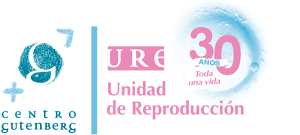Chronic endometritis: symptoms and treatment

Chronic endometritis is a long-lasting infection that is characterised by persistent inflammation of the endometrial tissue that lines the uterine cavity.
It’s difficult to quantify the incidence and prevalence of chronic endometritis. This is due to the fact that several uterine issues such as submucosal fibroids, endometrial polyps, endometrial hyperplasia, etc., also increase the likelihood of suffering from chronic endometritis. However, the primary cause of chronic endometritis is infection caused by microorganisms in the uterine cavity, mainly bacteria.
In this regard, there are different risk factors which may encourage this infection to appear and develop such as using an IUD, suffering a miscarriage with or without dilation and curettage, the presence of abnormal uterine bleeding, obstruction of a Fallopian tube or having already carried several pregnancies to term, etc.
In this article we’re going to talk to you more about chronic endometritis as well as what the symptoms are and what treatment options are available.
How chronic endometritis and infertility are related
Chronic endometritis is a silent illness that is present in a certain percentage of females who are not able to conceive naturally.
Different studies have shown that chronic endometritis may be prevalent in females with fertility issues, especially in those who have been diagnosed with implantation failure. In other words, in women who have undergone several cycles of IVF treatment (specifically, more than two unsuccessful embryo transfers), but who have not been able to conceive.
Investigations that have been carried out explain that chronic endometritis could disrupt what we call the “window of implantation”, which is the ideal period of time for embryo implantation to correctly take place in the endometrium. If the window of implantation is disturbed, endometrial receptivity will be lower. This disruption has also been associated with recurrent miscarriage and complications during pregnancy.
Symptoms and diagnosis of chronic endometritis
Generally speaking, when we talk about the symptoms of chronic endometritis we may encounter cases in which the female is asymptomatic or has very mild symptoms such as uterine bleeding, certain pelvic discomfort or abnormal vaginal discharge.
Having said this, the most reliable way to diagnose chronic endometritis is via an endometrial biopsy which allows us to study hystopathology, and/or an endometrial culture. In the histology study, the main finding, in order to diagnose chronic endometritis, is the presence of plasmocytes. The immunohistochemistry study focuses on the presence of the CD138 marker, which is one of the most sensitive markers for endometritis.
It is also possible to suspect the existence of chronic endometritis by observing the image of the endometrial cavity that is obtained during a diagnostic hysteroscopy; characteristic images include micropolyps and endometrial mucous that has the appearance of a “strawberry”.
These findings may be present in over 40% of patients with a diagnosis of implantation failure or recurrent miscarriage, and in one out of every four women with unexplained infertility.
Treatment for chronic endometritis
Despite the incidence of chronic endometritis, it’s fortunately straightforward to manage, and treatment is successful in the majority of cases. Over 80% of patients are cured after taking the appropriate course of antibiotics.
The most commonly prescribed antibiotic for chronic endometritis is doxycycline, which should be taken for fourteen days. Cases of resistant endometritis are treated with ciprofloxacin and metronidazole, also for fourteen days.
Fortunately for women who have this condition and are trying to get pregnant, treating this chronic inflammation -in patients diagnosed with implantation failure- could improve results such as their chances of conceiving and development of a viable pregnancy. On the other hand, not treating chronic endometritis is inevitably associated with lower success rates in assisted reproduction treatment.
That’s why at URE Centro Gutenberg we suggest discussing your particular case with a specialist in reproductive medicine if you know you have, or think you might have, this ailment. Request your appointment with us and we’ll be happy to help you.

